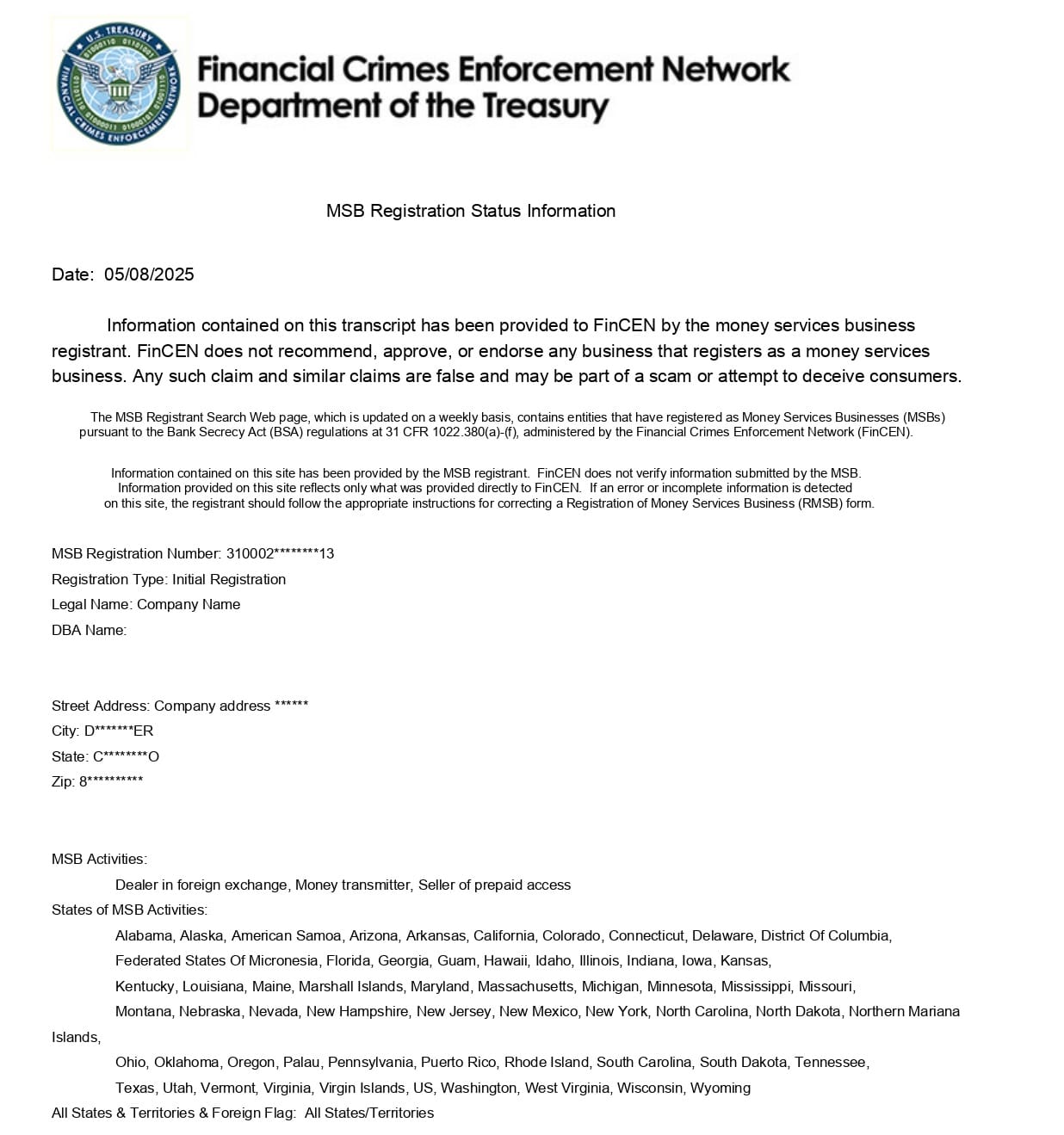US MSB License Registration

If your business involves activities like cryptocurrency exchanges, money transfers, check cashing, or any other services that fall under the Money Services Business (MSB) category, Buykii is here to help you obtain your MSB license from the Financial Crimes Enforcement Network (FinCEN). Whether you're a foreign company looking to expand into the US or a domestic business seeking to comply with US regulations, our expertise ensures you get your MSB license with minimal hassle and in record processing time. We’ll guide you through the entire application process, ensuring full compliance with regulatory requirements and fast, professional service every step of the way.
I don't have a company? Hire US to register US Company.

Who Needs to Register as an MSB?
Businesses involved in the following activities are required to register as a Money Services Business (MSB):
Crypto Exchange or Wallets
Money Transfer / Remittance
Foreign Exchange
Check Cashing / Prepaid Cards
Operating in US or Serving US Clients
Other Regulated Financial Services
When will you require a USA MSB License?
All money services businesses in the USA must apply for a MSB license under FinCEN regulations if they offer any of the following:
Money Orders / Traveler’s Checks
Money Transmission
Check Cashing
Currency Exchange
Prepaid Access
Foreign Exchange
Why Choose Buykii
Fast MSB Registration
Complete your registration in just 5–7 business days.
Full Compliance Support
We ensure your MSB meets FinCEN & AML requirements.
Crypto-Friendly Experts
Specialized support for crypto and digital currency MSBs.
Serve Global Clients
We assist both U.S. citizens and foreign founders.
1-on-1 Dedicated Support
Get a personal consultant throughout the process and access to 24/7 online chat support.
Extras & Add-ons
Need EIN, U.S. address, or banking help? We’ve got you covered.
Register US LLC
What Is an LLC Dissolution?
Running a business comes with changes—some exciting, and others more final. One such moment is when a business owner decides to close their LLC. It’s not just locking the door or deactivating a website—there’s an official process involved. This process is called LLC Dissolution.
Imagine you’ve registered your business, worked on it for a while, and then circumstances change. Maybe you're starting a new venture, relocating, or the business just isn’t working out. In these cases, you can’t just walk away—especially if your company is registered with the state. This is where dissolution of a limited liability company comes in.
So, What Exactly Is LLC Dissolution?
LLC dissolution is the legal process of officially closing or ending a Limited Liability Company with the state government. It means your business is no longer active in the state’s records and is not responsible for state fees, annual reports, or taxes moving forward.
To dissolve an LLC, you need to follow your state’s legal process. This usually includes filing an Articles of Dissolution LLC form and ensuring that all taxes and obligations are settled. Once approved, your business is considered legally closed.
Common Terms People Use
Many people use different phrases when talking about closing their business, like:
They all mean something similar, but the official term, especially in legal and state documents, is usually LLC Dissolution.
What Are Articles of Dissolution?
Articles of Dissolution is a legal document that you submit to your state government when you decide to dissolve your LLC or corporation. Filing this form lets the state know that your business is no longer active, and you won’t be responsible for any future filings, taxes, or fees.
In short, it officially ends the life of your business in the eyes of the law.
LLC Dissolution vs. Termination vs. Cancellation
Imagine you decide to close your LLC. You stop doing business, let your customers know, and maybe even sell off your assets. That’s part of what we call dissolution.
But even after all that, the LLC technically still exists on paper until you complete the final step — the termination.
LLC dissolution is the first formal step when you decide to end your business. It involves:
You're basically wrapping up the business’s affairs in a clean and legal way.
LLC Termination
Termination comes after dissolution. It’s the final move that legally removes your LLC from the state’s registry.
Once your LLC is terminated, it’s completely done:
Think of dissolution as closing the shop, and termination as turning off the lights and locking the door for good.
Why do I need a Registered Agent?
Having a registered agent is legally required in most states when forming an LLC. Without one, your business could face fines, lose good standing, or even be dissolved. It’s a small step that avoids big problems.
How Much Does It Cost to Dissolve an LLC?
The primary expense is the filing fee for your Articles of Dissolution LLC. This fee varies by state, typically ranging from $40 to $200.
Additional Costs to Consider
Tax Clearance Certificates- Some states (e.g., New Jersey, Illinois) require proof you’ve paid all state taxes before accepting your dissolution. Fees for tax clearance can be $10–$50.Expedited Processing - If you need your dissolution approved quickly, you can pay an extra $25–$100 for rush filing.
Attorney or Service Provider Fees - DIY is cheapest, but professional help (like Buykii) often charges a flat service fee—usually $49–$149 on top of state fees—for handling everything for you.
